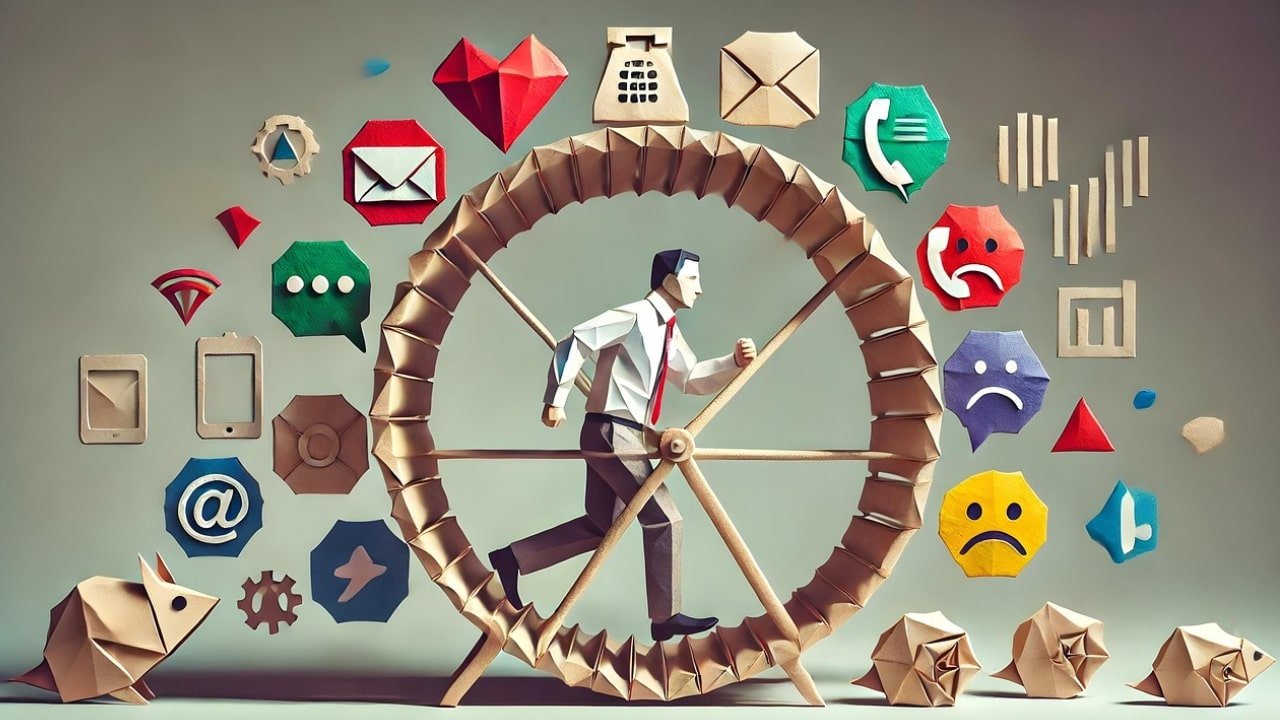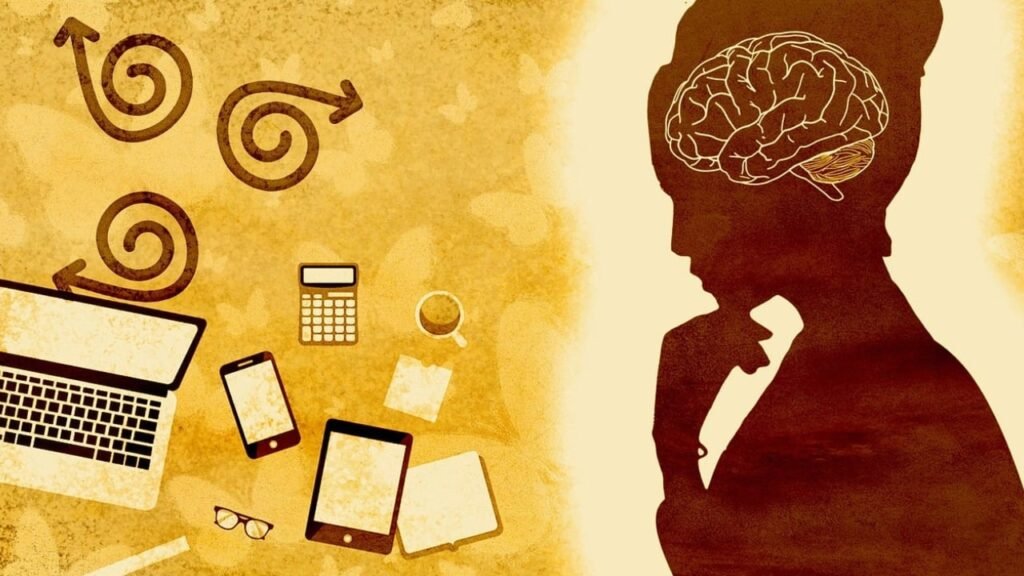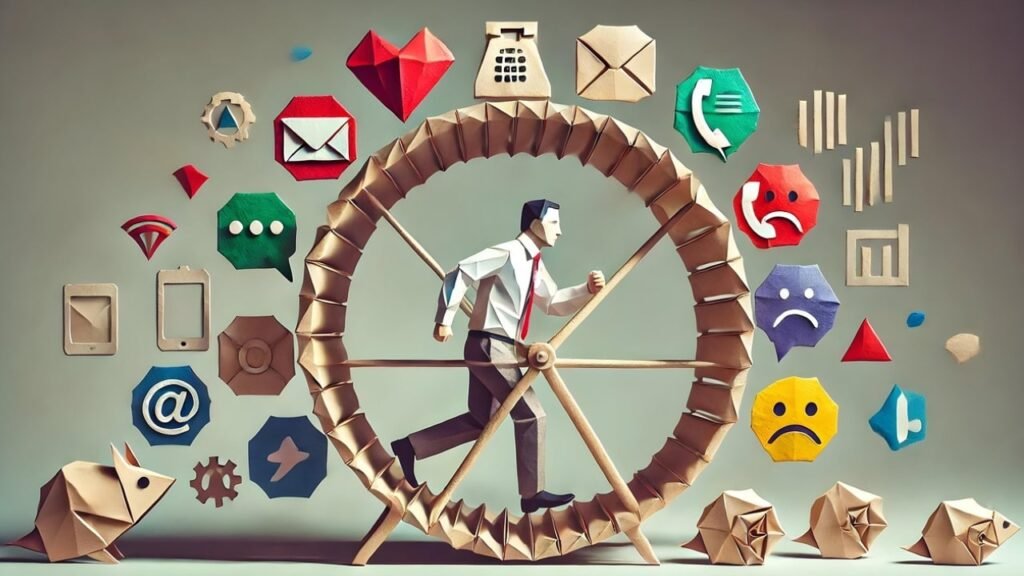
Table of Contents
Introduction
Do you know what is multitasking? This obsession with doing multiple tasks at the same time can lead to stress and anxiety.
Instead of processing simultaneously, the brain is rapidly switching between tasks. Many take pride in their multitasking skills, but the American Psychological Association states that shifting between tasks lowers productivity. So, is multitasking good or bad?
Research suggests it can temporarily lower IQ by up to 10 points if you engage in multitasking at work like checking your phone during meetings. In this article, we will understand the multitasking productivity myth and why the brain struggles while doing multiple tasks at once.
What is multitasking?

Simply put, multitasking means an attempt to perform two or more tasks simultaneously. This is different from ‘task switching.’
While multitasking means processing multiple tasks concurrently, task switching is rapidly shifting attention from one activity to another. Only about 2% of individuals can effectively multitask.
This continuous switching leads to ‘switch costs.’ It refers to the measurable reductions in performance when one moves between activities. As per studies, brief mental blocks resulting from switching tasks can reduce productivity by up to 40% . In fact, the cost for heavy media multitaskers is 167 milliseconds greater than those who multitask less.
Why can’t the brain handle multiple tasks at once?
First, let us look at a few common examples of multitasking:
- Driving while talking
- Checking social media in meetings
- Responding to emails while listening to podcasts
- Operating multiple devices at once
Our brains are not wired for managing multiple activities simultaneously. When we attempt to multitask, our brain engages in two stages: goal activation and rule activation. The former is when the brain is deciding to do one thing instead of another and the latter is turning on the rules for a new task.
This process creates interference between competing tasks because our brain networks struggle when multiple tasks fight for attention. Due to increased neural activity, multitasking attempts can lead to mental fatigue and decreased performance.
Instead of multitasking skills, the brain would prefer doing a single task with full attention before moving on to the next.
Why multitasking is bad?

Switching between tasks deeply affects cognitive performance.
Other muscles in the body store energy reserves, but not the neurons. The oxygenated glucose in the brain fuels all cellular activities and when you engage in task switching, it rapidly depletes.
Research shows that people tend to develop shorter attention spans and start to self-interrupt after being used to frequent interruption. Furthermore, constant switching triggers a dopamine-addiction feedback loop that rewards the brain for losing focus and continuously seeking external stimulation. This means your attention is easily disrupted by new stimuli.
What is the impact on memory and attention span?
You know who suffers the most due to multitasking? Your memory.
Stanford researchers have established a correlation between media multitasking, poor attention and memory loss. Alarmingly, the information gathered during multitasking ends up in the ‘wrong part of the brain’ that prevents proper storage and retrieval.
Specifically those engaged in media multitasking have reported more attention problems. Studies further suggest that after interruption, it takes approximately 23 minutes and 15 seconds to get back to the original task at hand.
What are the long-term effects on brain health?

Chronic multitasking can reshape your brain!
Recently conducted neuroimaging research sheds light on concerning structural changes that can have lasting implications on mental health.
Media multitasking is linked to reduced grey matter density in the anterior cingulate cortex (ACC), a region in the brain that is crucial for cognitive and emotional control functions. The structure differences seen in heavy multitaskers are the same as those observed in internet addiction disorders.
Heavy media multitaskers have also consistently demonstrated higher levels of impulsivity and are susceptible to distractions. Due to the wider attentional scope, the irrelevant information competes with the goal-relevant information in the mind and reduces the ability to hold precise representations in memory.
Is multitasking linked to anxiety and stress?

Proud of those multitasking skills? Read on!
Temporarily at least, multitasking increases stress levels that raises blood pressure and heart rate. Few studies have found links between media multitasking behaviors and symptoms of anxiety and depression.
Frequent multitasking decreases attentional control that increases negative information attentional bias – the tendency to focus on threatening or negative stimuli. This contributes to anxiety and depression.
On point, research suggests that individuals who multitask seem to be sadder than those who don’t and this sadness often mixes with fear.
With long-term brain health in consideration, multitasking has potentially serious consequences for emotional wellbeing and cognitive function.
Why does multitasking feel productive?
Stay away from the multitasking productivity myth!
Ever come across people who boast about their multitasking skills? In reality, it creates a deceptive cycle of reward in your brain.
Every time you respond to an email while reading some report, the brain releases dopamine. The resulting neurochemical reward makes you feel satisfied. In fact, you are addicted to your distractions. So the brain starts wanting constant stimulation instead of sustained focus.
Multitasking feels productive due to the dopamine-driven feedback loop. But, this addictive behavior actually reduces performance.
How does attention deficit lower performance?
You think you are able to switch from one task to another quickly, right? But your attention does not immediately shift. As per Professor Sophie Leroy, this phenomenon is called ‘attention residue.’
In this case, your thoughts from the previous task continue to occupy your mind even after you have turned to another task. Hence, neither task actually benefits from your full cognitive resources.
Studies have shown that people with a high level of attention residue perform worse on the next tasks. Not surprisingly then, the more complex the work, the more damaging attention residue is to performance.
Quick FAQs
Why not to multitask?
It negatively impacts memory, lowers IQ, and makes it difficult to learn new information.
Does multitasking make you productive?
In reality multitasking reduces productivity. Only 2% of people can effectively multitask without any negative impact on the performance.
What are the effects of multitasking on the brain?
Frequent multitasking is linked to reduced gray matter density in the anterior cingulate cortex. This region in the brain is crucial for cognitive and emotional control functions.
Does multitasking impact mental health?
Yes! Especially media multitasking has been associated with symptoms of both anxiety and depression.
Why does multitasking feel rewarding?
That’s because multitasking creates a dopamine-driven feedback loop in the brain. The ensuing short-term neurochemical reward that feels satisfying actually creates an illusion of productivity.
Conclusion: Is multitasking good or bad?
Now that you understand what multitasking is, do remember that its effects are harmful. It is linked to anxiety, stress, and reduces productivity. The heavy multitaskers find it difficult to focus and even filter out irrelevant information.
Multitasking at work can result in more errors and less creativity. Yes, even the briefest of interruptions can increase the errors when performing complex tasks. Studies also tell us that only about 2% of people can multitask effectively.
As for the rest, juggling multiple tasks simultaneously can lead to performance decline and attention residue. So, don’t fall for the multitasking myth. Here’s the mantra: one task at once with full attention.
Recommended Articles
If you found this topic interesting, you might also enjoy reading these articles:
Unemployment Problem in India: Top Challenges and Best Solutions


